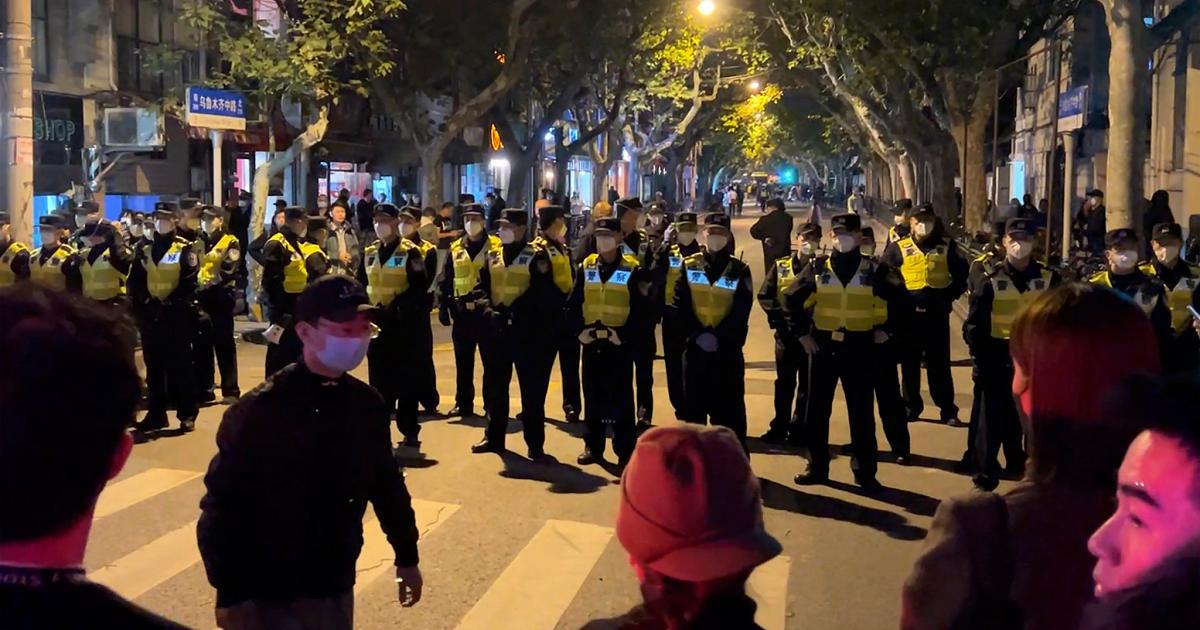From Beijing to Shanghai:
protests against the anti-Covid restrictions are
mounting in China and reaching as far as Wuhan, the symbolic city where the pandemic began three years ago.
The protesters' anger was triggered by a fire in a skyscraper in Urumqi, the capital of Xinjiang, in which ten people died.
Authorities have been accused of slowing down relief efforts due to strict rules against the spread of the virus.
While denying any guilt, officials issued an unusual apology and promised to "restore order" by lifting restrictions in nearly all neighborhoods of the city under lockdown.
Photos of the victims were exhibited online and at vigils organized to commemorate them at universities in Beijing and Nanjing, which in many cities have turned into protests unprecedented in China, with slogans against the Communist Party and President Xi Jinping.
The protest in Shanghai
"Down with Xi Jinping", "Xi resign", is heard shouting in the videos arriving from Shanghai and circulating on the net, despite the censorship, taken up by the international media.
The victims of the fire in the street named after the city in the autonomous Chinese region, where the Uyghur minority lives, were remembered in the city.
"To our friends in Urumqi: I love you as I love this road, as I love my family", is one of the solidarity slogans written on a sheet hanging from a lamppost.
A Shanghai protester quoted by the BBC said he was "shocked and excited" by the anti-lockdown protests, which had never gone this far: he had never seen demonstrations on such a large scale, in a very clear signal of citizens' level of exasperation towards the anti-pandemic measures in force.
"No more tampons, we want freedom!"
was another of the slogans.
It is not the first time that the protests against the zero Covid have led to clashes between citizens and the police, and Shanghai has been at the center of the strongest protests, during the two months of lockdown to which the metropolis was subjected in April and May.
A protester told the AP news agency that one of his friends was beaten by police, others were pepper sprayed.
In some videos, protesters are seen being taken away by the agents.
As in Moscow, blank sheets also in Beijing
Shanghai and Beijing are the epicenters of the protest that is also mounting in other cities, such as Nanjing and Qingdao, despite the arrests already made yesterday.
In the capital, according to reports from a student of Tsinghua University, one of the most prestigious in the capital, between 200 and 300 students protested by showing blank sheets of paper, the new symbol of anti-lockdown protests.
Demonstrations in the university, after the violent repression of 1989, are extremely rare.
The blank sheets, already seen in Hong Kong, in response to the city's ban on using certain protest slogans, and in Moscow, in protests against the war in Ukraine, are not only symbolic but also a tactic to avoid arrest or violate country's censorship laws especially affecting social media platforms, forcing citizens to bypass the issue.
In online chat rooms, protesters are advised to bring a blank sheet of paper.
The engine of the protest is WeChat, the social network that the Chinese now use to do everything, talk to each other and buy milk, and which for this reason the government cannot block unless it risks paralyzing the country.
In Beijing, even today a few hundred people, mostly young people, gathered along the Liangma River to hold a vigil - in spite of the anti-pandemic restrictions - in memory of the victims of the Urumqi fire.
Songs, including the Internationale, were sung in a calm atmosphere, while numerous police cars arrived at the scene.
Hundreds in the square in Wuhan
In the city where the covid pandemic originated in early 2020 and where the first lockdown was introduced, hundreds of people are demonstrating to protest against the zero tolerance policy introduced by the government.
People break down barriers, as was done in Shanghai too, and chant the slogan "It all started in Wuhan, it will end in Wuhan".
The “zero Covid” policy
China is in the midst of the worst wave of Covid-19 infections since the beginning of the pandemic, with new records set in recent days.
Today, the National Health Commission reported 3,648 cases of contagion from local transmission, in addition to 35,858 asymptomatic cases: the metropolises of Guangzhou, Chongqing and Beijing are the cities where the highest numbers are recorded.
Although the figures are low compared to other countries in the world, the zero Covid policy applied in China aims to eradicate the virus with mass swabs, sudden and indefinite lockdowns for millions of people even on a handful of infections, quarantine for those entering China from abroad, and no signs of any real easing of restrictions.
Xi himself called the Covid-zero line "inexpensive" despite the restrictions having brought down the economy, and clearly stated that the government's line will remain in place until the "final victory" over the virus is achieved.

